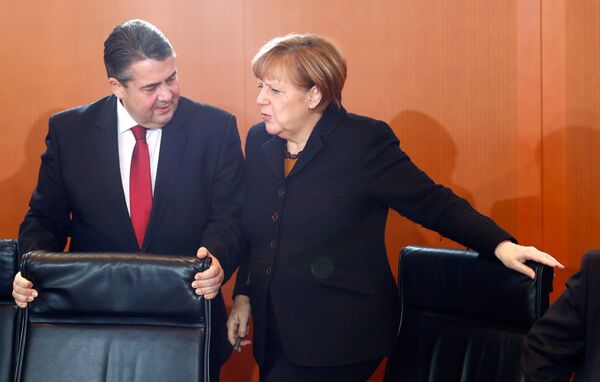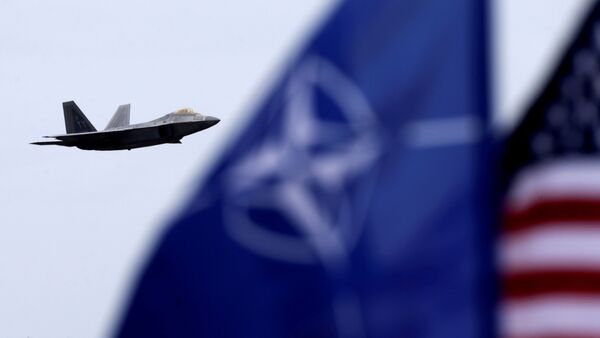Tillerson said at the time he wanted to ensure the alliance had "all the resources, financial and otherwise" necessary for NATO to "fulfil its mission," echoing the sentiments of President Donald Trump.
Trump has consistently railed against NATO members for not meeting the target — in his first address to Congress, Trump said the US expected NATO partners "to take a direct and meaningful role" in both strategic and military operations, and "meet their financial obligations."
The failure of NATO members to pay their way is a historic issue. In 2016, the US, UK, Greece, Estonia and Poland are the only states in the 28-country bloc that met their annual obligation. In 2017 the figure is on track to almost halve, with the US, Greece and Estonia the sole members footing their expected bill, despite UK Defense Secretary Michael Fallon calling on NATO members to increase their defense spending in February.
Defence Expenditures of #NATO Countries (2009-2016) https://t.co/2QeKFAmhyW pic.twitter.com/brurWLDcu1
— NATO (@NATO) July 6, 2016
There's little suggestion this state of affairs will be remedied. Some countries in the alliance, such as Romania, have indicated a desire to raise their defense budgets. States not wishing to stump up the capital have found a strong ally in German Foreign Affairs Minister Sigmar Gabriel, who has made clear he views the two percent figure as a guideline, not a requirement. Germany currently spends around 1.2 percent of its GDP on defense, or around US$37 billion (€35 billion) — by definition, to reach two percent would necessitate almost doubling that figure, a prospect Gabriel dubbed "totally unrealistic."
"I don't know any German politician who would claim that is reachable or desirable. We respect the two percent [figure], but it was formulated as a guideline, not a goalpost," he said.
Sigmar's comments are an expression of the rarely acknowledged rupture in Germany's ruling coalition — Gabriel's Social Democrats (SPD), junior coalition partners to Chancellor Angela Merkel's Christian Democrat Union (CDU), back low military spending and limited military engagement, while Merkel's conservatives generally favor a beefed-up military role for Germany in the 21st century.
This dispute is representative of a wider divergence in German society — due to Germany's military history, much of the public oppose conflict, and resist attempts to heighten the country's defense budget.
The "call for burdensharing" Gabriel accepts is very specific. Also Gabriel's remarks not consistent with Merkel's on #NATO defense spending https://t.co/824abGCbtl
— NATOSource (@NATOSource) April 4, 2017
As a demonstration of this resistance, according to a poll published in German media, opposition to the controversial, potentially illegal April 7 US airstrike in Syria is sizeable among the German public. In all, 59 percent disapprove of the attack, with 26 percent approving, although 80 percent overall said there should be no more strikes on Syrian territory — and 40 percent said they feared the strike could provoke a conflict between the US and Russia. Even if Merkel wishes to meet the two percent target, public hostility, and the opposition of the SPD, may be insurmountable barriers to achieving that end.
It's not merely in Germany where US demands for increased military spending are falling on deaf ears. In France, La France Insoumise candidate Jean-Luc Melenchon has denounced Trump's decision to launch missile strikes in Syria as a "criminal, irresponsible act" that would only increase tensions, and called for French withdrawal from NATO in order to avoid a confrontation with Russia. Front National candidate Marine Le Pen has also expressed skepticism about France's continued role in the alliance, and urged US prudence in Syria, stating lessons should be learned from calamitous Western engagements in Iraq and Libya.

Similarly, Gabriel isn't the first to question the necessity of the two percent target.
Military analyst Ilya Plekhanov has suggested it "says nothing" about military capability or readiness — instead, how many tanks a country maintains, or how many new missiles it has acquired are the genuinely serious considerations in a conflict.
"China spends [just over] one percent of its GDP on defense, and that is worrying to Washington. Greece spends over two percent, but who can say the nearly bankrupt country is making a significant contribution to financing the alliance's common defense? What real military contribution is made by Estonia?" he added.
There are more European than US troops in the Balkans, and European naval vessels patrol the waters of the Mediterranean Sea and the Indian Oceans. All this is achieved without meeting the target.
Washington's dreams of a NATO in which every member is a profligate defense spender may yet go unfulfilled.



